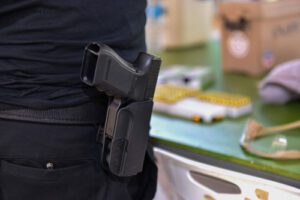 The District Court continued: 4. Subpart 24 – Private Property (Unless Indicated Otherwise by Owner) Subpart 24 of the statute deals with private property, which is defined as: Private property, including but not limited to residential, commercial, industrial, agricultural, institutional or undeveloped property, unless the owner has provided express consent or has posted a sign indicating that it is permissible to carry on the premises a concealed handgun with a valid and lawfully issued permit under N.J.S.2C:58-4, provided that nothing in this paragraph shall be construed to affect the authority to keep or carry a firearm established under subsection e. of N.J.S.2C:39- 6. 2022 N.J. Laws c. 131 § 7(a).
The District Court continued: 4. Subpart 24 – Private Property (Unless Indicated Otherwise by Owner) Subpart 24 of the statute deals with private property, which is defined as: Private property, including but not limited to residential, commercial, industrial, agricultural, institutional or undeveloped property, unless the owner has provided express consent or has posted a sign indicating that it is permissible to carry on the premises a concealed handgun with a valid and lawfully issued permit under N.J.S.2C:58-4, provided that nothing in this paragraph shall be construed to affect the authority to keep or carry a firearm established under subsection e. of N.J.S.2C:39- 6. 2022 N.J. Laws c. 131 § 7(a).
As is apparent from the language, Subpart 24 is very broadly defined. As a result, Plaintiffs argue, this provision essentially bans the carrying of firearms by permit holders in almost all of New Jersey. First, the plain text of the Second Amendment covers the conduct in question. But unlike the other provisions that Plaintiffs challenge, this provision bans the carrying of firearms unless and until the owner has affirmatively and expressly consented to the carrying of a firearm on the premises. Plaintiffs contend that this provision establishes an “anti-carry” presumption and therefore establishes an unconstitutional “default ban” on the carry of firearms for self-defense. [Pls.’ Br. at 26.] In other words, Defendants are flipping the constitutional presumption that a permitted gun owner can carry for self-defense in public by declaring that all private property, which is the vast majority of property in the State, is now off limits unless a property owner affirmatively consents or posts a “guns allowed” sign.
Defendants disagree, arguing that while there has always been a presumption that one has a right to carry on public property, no such presumption exists with respect to private property because a property owner has always had the right to be “king of his own castle.” GeorgiaCarry.Org, Inc. v. Georgia, 687 F. 3d 1244, 1264 (11th Cir. 2012). Defendants’ argument is somewhat of an “apples and oranges” argument. Just because a property owner has always had the right to exclude firearms from his property—a proposition Plaintiffs do not dispute—does not mean that the right of the people to keep and bear arms was presumed only on public property. Defendants seem to turn a private property owner’s lack of consent and/or right to exclude into a general proposition that the Second Amendment does not presume the right to bear arms on private property. Nothing in the text of the Second Amendment draws that distinction.
This section was the clearest effort by the Legislature to undermine the Bruen decision. The State’s only hope in having this sub-section enforced by the police was that it would not be challenged in a case like the instant one. Even then, the first defendants charged criminally would have had every reason to challenge the constitutionality of this portion of the statute.
